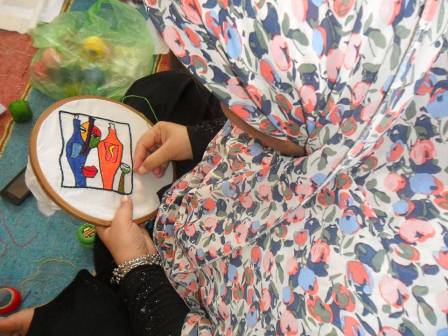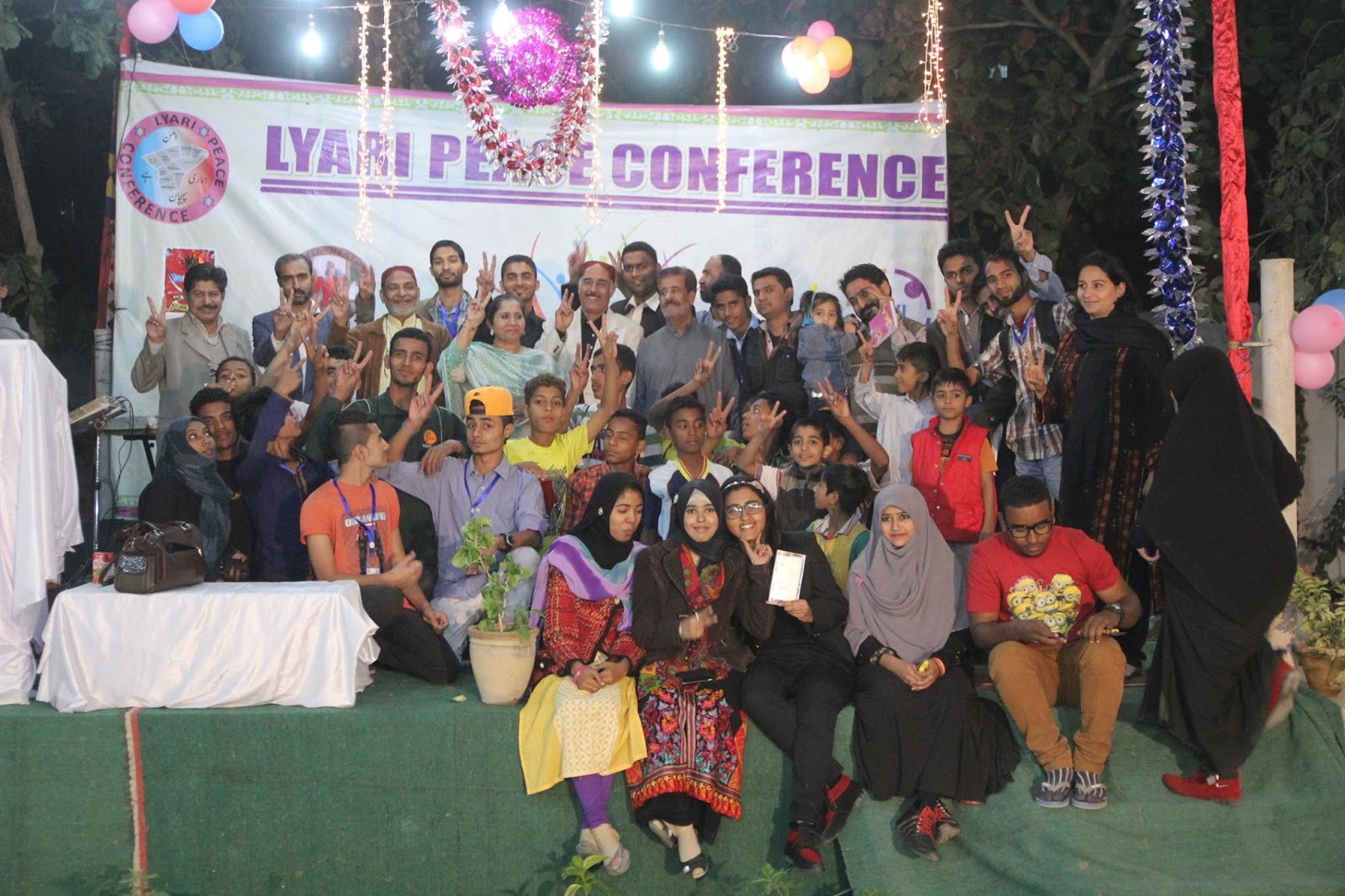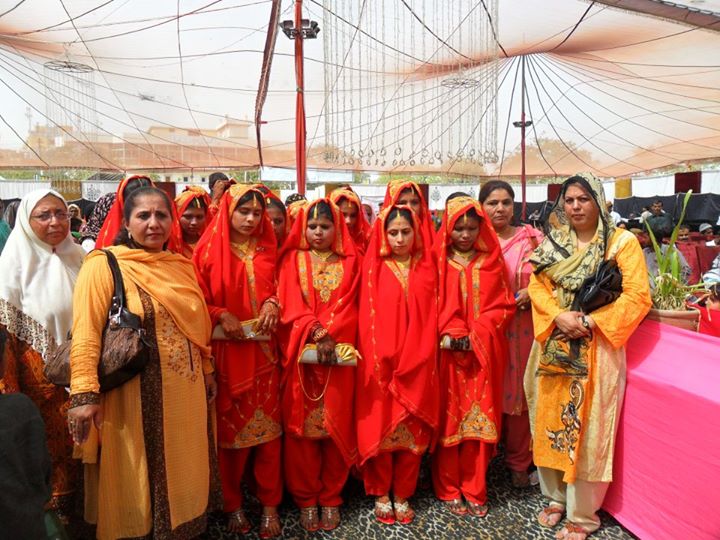Sabiha Shah of WDFP Pakistan – how to address gender issues in Pakistan
By Denise
Nanni and Milena Rampoldi, ProMosaik. In the following our interview with
Sabiha Shah of the Women’s Development Foundation
Pakistan (WDFP) struggling against female illiteracy and poverty in
Pakistan. Women need education for their empowerment, and for the empowerment
of their communities.
Nanni and Milena Rampoldi, ProMosaik. In the following our interview with
Sabiha Shah of the Women’s Development Foundation
Pakistan (WDFP) struggling against female illiteracy and poverty in
Pakistan. Women need education for their empowerment, and for the empowerment
of their communities.

Men misuse their power against women. Women have to be
strengthened to struggle all togetheer against oppression by domestic violence,
rape, early marriage, and child marriage, among others. The main reason for violence against women is this, as Sabiha suggests: “Actually the weak
men of society fear the loss of their control on women therefore they don’t
want the women to be empowered for their rights.”
strengthened to struggle all togetheer against oppression by domestic violence,
rape, early marriage, and child marriage, among others. The main reason for violence against women is this, as Sabiha suggests: “Actually the weak
men of society fear the loss of their control on women therefore they don’t
want the women to be empowered for their rights.”
Would like to thank Sabiha for her time and
the photos she sent us.
the photos she sent us.
How was
the WDFP founded?
the WDFP founded?
The Women’s Development Foundation Pakistan
(WDFP) is an extension of the Women Skill Development Project (WSDP)
established in January 1994, but it is originated and registered under VSWA Act
1961 No. DSW (2112)-K on 16th May 2004. Mrs. Sabiha Shah is the founder of WDFP
who started working from her School age and always actively took part in social
development. Before WDFP she worked in the Women Committee of the Lyari
Community Development Project, where she carried out multiple programs of women
empowerment and realized the need to strengthen a completely separate
organization to address and resolve issues related to women.
(WDFP) is an extension of the Women Skill Development Project (WSDP)
established in January 1994, but it is originated and registered under VSWA Act
1961 No. DSW (2112)-K on 16th May 2004. Mrs. Sabiha Shah is the founder of WDFP
who started working from her School age and always actively took part in social
development. Before WDFP she worked in the Women Committee of the Lyari
Community Development Project, where she carried out multiple programs of women
empowerment and realized the need to strengthen a completely separate
organization to address and resolve issues related to women.
WDFP aim to support women in all fields of life
and is striving to mobilize maximum resources for overall empowerment of the
under privileged and neglected women folk. WDFP has been working in the slums
of Karachi especially in Lyari, coastal area of Kemari, Maripur, Baldia,
Korangi and Bin Qasim Town on multiple issues in development sector. WDFP has
an active network of civil society organization that supports its developmental
activities.
and is striving to mobilize maximum resources for overall empowerment of the
under privileged and neglected women folk. WDFP has been working in the slums
of Karachi especially in Lyari, coastal area of Kemari, Maripur, Baldia,
Korangi and Bin Qasim Town on multiple issues in development sector. WDFP has
an active network of civil society organization that supports its developmental
activities.

What
are the main issues related to gender inequality in Pakistan?
are the main issues related to gender inequality in Pakistan?
The issues of gender inequality
in Pakistan can be found in all levels of socio economic backgrounds. Women in
Pakistan face exploitation of their rights in many ways. A few general issues
are that women from urban slums and rural areas of Pakistan are not allowed
from their male counterparts to go to NADRA office to get their National
Identity Cards, Early marriage is forced and no right to choice for marriage is
given to them, lack of education, lack of awareness and access to information,
no freedom for free movement and no freedom to learn and earn for their
financial stability. In mostly cases, they are unable to report the violence
they face such as domestic violence, harassment from in-laws, mental torture,
daily conflicts and disputes with life partner because the society has accepted
this violence as a part of culture/norm. These problems reduce the
productivity of women at home and they become unable to pay proper attention on
training and nurturing their children as active member of society.
in Pakistan can be found in all levels of socio economic backgrounds. Women in
Pakistan face exploitation of their rights in many ways. A few general issues
are that women from urban slums and rural areas of Pakistan are not allowed
from their male counterparts to go to NADRA office to get their National
Identity Cards, Early marriage is forced and no right to choice for marriage is
given to them, lack of education, lack of awareness and access to information,
no freedom for free movement and no freedom to learn and earn for their
financial stability. In mostly cases, they are unable to report the violence
they face such as domestic violence, harassment from in-laws, mental torture,
daily conflicts and disputes with life partner because the society has accepted
this violence as a part of culture/norm. These problems reduce the
productivity of women at home and they become unable to pay proper attention on
training and nurturing their children as active member of society.
What
are the projects you implement to promote women empowerment?
are the projects you implement to promote women empowerment?
Women
Development Foundation Pakistan works on the holistic development of women, for
which we carry out projects of educational programs for women; including
formal, informal and non-formal programs, vocational programs for skill
development through courses of stitching, beautician and computer learning,
micro-entrepreneurship, youth development programs, human rights (women &
children), human resource development, peace promoting activities, charity
programs, mass marriage arrangements of destitute couples, marriage counseling,
pre marriage blood test and community development programs.
Development Foundation Pakistan works on the holistic development of women, for
which we carry out projects of educational programs for women; including
formal, informal and non-formal programs, vocational programs for skill
development through courses of stitching, beautician and computer learning,
micro-entrepreneurship, youth development programs, human rights (women &
children), human resource development, peace promoting activities, charity
programs, mass marriage arrangements of destitute couples, marriage counseling,
pre marriage blood test and community development programs.

What
are the main challenges to women empowerment in Pakistan?
are the main challenges to women empowerment in Pakistan?
Pakistan
represents a male dominant society. The household heads are men in Pakistan and
taking the lead position in family they often miss-uses their power. The
challenge of unequal behavior and facilities is the most common challenge.
Though Pakistani women are struggling really hard for getting equal rights but
it can be said that it will still take many years to bring gender equity in
Pakistan. Another challenge is to fight with stigma and discrimination which
the society associates with working women and the men who claim to protect
their women by keeping them safe at homes, harass women mentally and physically
who step outside their homes in order to attain their rights. Actually the weak
men of society fear the loss of their control on women therefore they don’t
want the women to be empowered for their rights.
represents a male dominant society. The household heads are men in Pakistan and
taking the lead position in family they often miss-uses their power. The
challenge of unequal behavior and facilities is the most common challenge.
Though Pakistani women are struggling really hard for getting equal rights but
it can be said that it will still take many years to bring gender equity in
Pakistan. Another challenge is to fight with stigma and discrimination which
the society associates with working women and the men who claim to protect
their women by keeping them safe at homes, harass women mentally and physically
who step outside their homes in order to attain their rights. Actually the weak
men of society fear the loss of their control on women therefore they don’t
want the women to be empowered for their rights.

How
would you define your approach?
would you define your approach?
WDFP works through the
inclusive and holistic approach. We believe that we can’t empower women until
we taught men to give them equal rights. Our programs include trainings for
both men and women, girls and boys so that they both treat them well and a
balanced society can be developed.
inclusive and holistic approach. We believe that we can’t empower women until
we taught men to give them equal rights. Our programs include trainings for
both men and women, girls and boys so that they both treat them well and a
balanced society can be developed.
Do you
cooperate with local authorities and institutions? If yes, how?
cooperate with local authorities and institutions? If yes, how?
Yes, WDFP works in different
areas and with different communities. Before starting any of our projects we
involve the interest of local authorities and stakeholders so that we can
achieve our goals easily.
areas and with different communities. Before starting any of our projects we
involve the interest of local authorities and stakeholders so that we can
achieve our goals easily.



